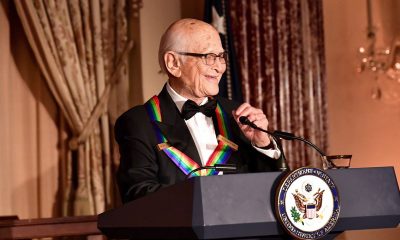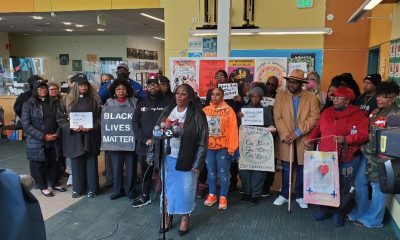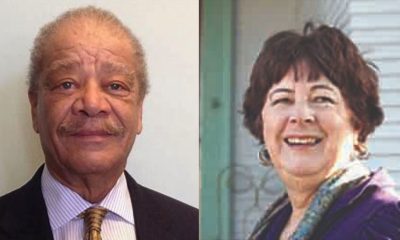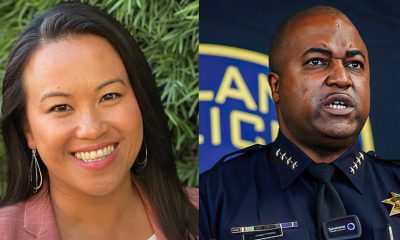Entertainment
TV Networks Make Unequal Progress Toward On-Screen Diversity

In this image released by ABS, Anthony Anderson, left, and Tracee Ellis Ross appear in a scene from “Black-ish.” The series was created by Kenya Barris, who was motivated to write the comedy about an African-American family’s efforts to honor its heritage in part by the unreality of what he grew up watching on television. (AP Photo/ABC, Kelsey McNeal)
DAVID BAUDER, AP Television Writers
LYNN ELBER, AP Television Writers
FRAZIER MOORE, AP Television Writers
Kenya Barris, creator of ABC’s “black-ish,” was motivated to write the comedy about an African-American family’s efforts to honor its heritage in part by the unreality of what he grew up watching on television.
“I saw ‘Friends’ and ‘Seinfeld’ and thought, ‘What part of New York is this?'” recalled Barris, who is black. “It’s not about being diverse. It’s about being true to the world.”
His show comes 15 years after civil rights groups, galvanized by a lineup of new network series almost entirely devoid of minority characters, sought and ultimately won agreements from major broadcasters to put programs on the air that better reflect the nation’s population.
An AP analysis of regular cast members on prime-time comedies and dramas on ABC, CBS, NBC and Fox found progress since then in hiring black actors, but slighted other minorities. Casts at three of the four networks are still whiter than the nation as a whole.
That’s in contrast to a fall 2014 season that seemed to signal broad change. Besides “black-ish” and a trio of shows from black megaproducer Shonda Rhimes, it offered Asian-American crime fighters and Latino families.
Among the key findings of the AP analysis:
— ABC, NBC and Fox now have a higher percentage of blacks in prime time than there is in the general population — a significant change over 1999. The difference is most dramatic at Fox: 6.5 percent of characters in lead or supporting roles were black in 1999 to 21 percent black this past fall, a number that notched up again with January’s premiere of “Empire,” a drama about an African-American family’s music dynasty.
— Other ethnic groups don’t do nearly as well. While Latinos are the nation’s largest minority group at more than 17 percent of the population, only Fox and ABC have Latino representation of as much as 10 percent.
— CBS, the nation’s most popular network, had the most diversity 15 years ago and now has the least. CBS programs are whiter now than they were then.
Time has not made broadcast’s role moot. Network fare remains dominant for most consumers despite an explosion of niche cable channels and streaming services that cater to seemingly every possible demographic. What Americans see — or fail to see — on the networks has a powerful impact on how individuals regard themselves as part of the nation’s mosaic.
Gina Rodriguez, the Golden Globe-winning star of the CW’s new telenovela-inspired comedy “Jane the Virgin,” knows what it’s like to be left out of the TV picture.
“Ten years ago, when I was looking at that screen and didn’t see myself at all, I knew there was no place (for me). Or I was too out of the box, too much of a risk,” she said. “People say this (show) is too much of a risk. … Which is so sad, because it’s the same story, just told by a new face.”
CHANGING ATTITUDES
In 1965, after NBC cast Bill Cosby in “I Spy,” young Kweisi Mfume’s mother sent her son to knock on doors in their Baltimore neighborhood to spread the word: “There’s a colored man on TV!” Cosby had become the first black to star on a network drama. In 1999, as head of the NAACP, Mfume was among the leaders pressuring networks on diversity.
“One can make the argument it’s been progress over 15 years, but it’s still been 15 years and that’s a lot of time to go by to see some of these changes incrementally,” said Mfume. “We can get pleasantly and romantically drunk by looking at all (Rhimes) is doing. … But at the same time, she’s one person at one broadcast network.”
Hollywood’s commitment to diversity has been an issue on numerous fronts in recent weeks: Not a single Oscar nominee in an acting category is black, and the critically acclaimed “Selma” got just two Oscar nods for best picture and best original song. Emails exposed by the Sony Pictures hacking revealed racist jokes referencing President Barack Obama by Amy Pascal, head of that studio’s film division. Comic Chris Rock wrote a detailed essay for The Hollywood Reporter saying that entertainment is a white industry, “just as the NBA is a black industry.”
Granted, TV history contains minority success stories. Desi Arnaz loved Lucy in the 1950s; “Good Times,” ”The Jeffersons” and “Chico and the Man” were popular in the 1970s, the same decade that the “Roots” miniseries set viewership records; and Cosby was TV’s father figure in the 1980s.
But whether due to timidity or cluelessness on the part of executives, or segregation unwittingly enabled by the growth of niche networks, that picture did not translate to lasting diversity on the networks. By the fall of 1999, ABC, NBC and Fox each had prime-time casts that were 86 percent white — at a time when the U.S. Census put the non-Latino white population at 71.9 percent.
In fall 2014, with the non-Latino white population estimated at 62.6 percent, CBS’ series cast and characters were 79.2 percent white; ABC’s were 72.7 percent; and NBC’s were 69.7 percent. In contrast, Fox’s slate stands at 60 percent white.
The Census Bureau counts blacks as 13.2 percent of the U.S. population. Blacks made up 15 percent of cast members in fall shows on ABC and NBC.
“We try to make sure the numbers we have reflect our society,” said Karen Horne, NBC’s vice president of programming talent development and inclusion. “We’re servicing people we’re broadcasting to.”
Dana Walden, chairman and CEO of the Fox Television Group, said race wasn’t even brought up when she was told that Nicole Beharie, who is black, was cast as the female lead in “Sleepy Hollow.”
“To me, that represents a quantum leap from where I’ve seen this industry start when I was a young executive,” Walden said.
Stephanie Beatriz, who plays a police detective on Fox’s sophomore comedy “Brooklyn Nine-Nine,” worked extensively in theater and enjoyed the freedom of appearing in a range of “colorblind” stage roles as well as playing specifically Latina characters.
“Then, coming to L.A., I realized there’s still a lot more narrow-mindedness in where I’m ‘allowed’ to fit in. But at the same time I do see it changing,” said Beatriz, one of two Latinas in her show’s nine-member ensemble. “There’s been an explosion of different types of people in television.”
CBS CASTS WHITER
Such even-handed treatment is what the NAACP and other groups sought. In response to a hearing held by that group in 1999, top CBS boss Leslie Moonves pledged improvement.
“We’re not only putting it in writing,” Moonves said. “We’re putting our money where our mouth is.”
But CBS’ Fall 2014 lineup did not show improvement: The number of white characters was up, and black representation had slipped to just under 7 percent, less than half what it was in 1999, according to the AP’s tally from the network’s own cast lists.
“We are victims of our own success to a certain extent,” said CBS Entertainment President Nina Tassler by way of explanation.
CBS has been the most-watched network in prime time for much of the past decade and, as a result, has had less programming churn. The network’s audience is also older than its rivals. All of that is a recipe for conservative program and cast choices, while a network with more series turnover, like ABC, is apt to take more chances.
When CBS launched a new comedy about an Irish-American family from Boston (“The McCarthys”) this fall, all the stars were white. “Mom,” another CBS comedy, also has an entirely white cast.
But Tassler (who is a Latina) said the network has not become complacent about the issue and makes diversity a big part of its casting discussions. “What I think is most important is keeping the conversation going, never feeling like it’s ‘mission accomplished,'” she said.
Tiffany Smith-Anoa’i, who oversees CBS’ diversity efforts, noted that progress in diversity is more than a black-and-white issue. She pointed to the prominent role on “The Good Wife” of Archie Panjabi, who is Indian, and Asian actress Maggie Q’s lead role on this fall’s new “Stalker.” Asian actress Lucy Liu co-stars on “Elementary.” On “The McCarthys,” one of the family members is gay, she said.
Jennifer Salke, NBC’s entertainment president, says shows with all-white casts “would just never fly” at NBC: All 13 of the network’s scripted shows this fall had at least one minority cast member.
“It would be a big surprise to us if somebody (pitching a series) said, ‘My ensemble character show has an all-white cast,'” she said.
None of the minority cast members on those 13 shows, however, enjoys marquee status: Even on “State of Affairs,” a drama in which Alfre Woodard plays President Constance Payton, Katherine Heigl is the designated star. On ABC, which has a nearly identical percentage of blacks on the air as NBC, Kerry Washington is the leading lady of “Scandal.” Viola Davis is clearly No. 1 on the call sheet on “How to Get Away With Murder.” And Anthony Anderson and Tracee Ellis Ross share top billing on “black-ish.”
ON-SCREEN AND OFFSCREEN ISSUES
Barris (who before “black-ish” created “America’s Next Top Model” and wrote for the sitcom “The Game”) said the important question for networks is whether they are giving a voice to people who are watching their channels — including blacks, who watch more TV than whites, according to the Nielsen company.
“Black culture is not monolithic,” said Barris, “and there are a million different voices. But our show can be ONE of the voices.”
The same goes for Latinos, said Eva Longoria, the “Desperate Housewives” star who’s also a producer, with series including “Devious Maids” for Lifetime and the newly announced sitcom “Telenovela” for NBC.
“Don’t just tell the immigrant story,” she said. “Tell the story of the doctor and tell the story of the lawyer and tell the story of the romantic comedy and the genre story.”
People who follow the issue say a key way to boost a minority presence on-screen is to step it up offscreen. But too often that isn’t part of the equation.
Rhimes is arguably the most powerful producer in television these days. ABC has turned over to her its entire Thursday-night prime-time lineup, where she delivers weekly episodes of “Grey’s Anatomy,” ”Scandal” and “How to Get Away With Murder.”
“I remember growing up,” said Rhimes, now 45, “and thinking, ‘Why doesn’t TV look like the world that we live in?’ There were no older people, no larger people, no people of color, no gay or interracial couples. It didn’t make sense to me.”
When she created “Grey’s Anatomy” a decade ago, she was determined to make it “look like the world outside looks. And it was really easy to do. We said, ‘Actors of all colors — everybody show up for every role! We’re gonna cast the best actor for each part.'”
A report by UCLA’s Ralph J. Bunche Center for African American Studies illustrates how much of an outlier Rhimes is: During the 2011-12 television season, minorities were credited as creating just 4 percent of broadcast comedies and dramas, the report said. The writing staffs for a majority of scripted shows were at least 90 percent white.
A new Directors Guild of America study found a similarly lopsided picture among entry-level directors of TV series between 2009 and 2014, with men representing 82 percent of first-time directors and whites at 87 percent.
That lack of progress within executive suites and the creative ranks is what most saddens Mfume when he looks back at the NAACP’s efforts in Hollywood. It’s also one of the reasons filmmaker Robert Rodriguez started the El Rey network aimed at English-speaking Latinos. “You can only tell a network so long to cast a Hispanic,” Rodriguez said. “But if there’s nobody writing the roles or creating the roles, it’s even fundamentally a larger problem.”
More recently, the networks began hosting showcases specifically designed to give exposure to talented minorities, like the comedy event CBS organizes for actors every January. Fox holds a forum, “Seizing Opportunities,” where the creative community is brought in to learn how diversity can be good business. ABC does separate workshops for black, Latino and Muslim writers seeking to break into the industry.
“Whether it was under pressure or whether it was the right thing to do, all of the programs that we set up planted seeds that are really blossoming now,” said Paul Lee, ABC entertainment president.
A participant in a CBS showcase this month, Judilin Bosita, an Asian-American actress, said she’d grown used to auditioning for “smart, technical roles” such as the nurse she’s played on “Days of Our Lives.”
The event — a night of comedy sketches performed for industry insiders — “shows them what we can do,” Bosita said, helping to replace outdated ideas with a new epiphany: “‘Oh, wow, there’s a whole slew'” of talented people of every background.
The importance of the efforts is underscored by Jason George, whose acting credits include a recurring role on “Grey’s Anatomy” and who works on diversity issues for the Screen Actors Guild-American Federation of Television and Radio Artists. George said that when he was hired at a soap opera in the 1990s, a writer proudly told him that they had purchased an urban dictionary to help them write scenes he was in authentically.
That’s OK, George assured him: “Just write normal dialogue.”
Now minority actors increasingly are being given more well-rounded roles, George said.
“You’re suddenly a person and not just a representative of a culture,” he said. “As an actor, that’s what you want.”
Copyright 2015 The Associated Press. All rights reserved. This material may not be published, broadcast, rewritten or redistributed.
Activism
Oakland Post: Week of April 17 – 23, 2024
The printed Weekly Edition of the Oakland Post: Week of April 17 – 23, 2024

To enlarge your view of this issue, use the slider, magnifying glass icon or full page icon in the lower right corner of the browser window. ![]()
Entertainment
O.J. Simpson, 76, Dies of Prostate Cancer
Orenthal James (O.J.) Simpson, who rose to fame as a college football player who went on to the NFL and parlayed his talents in acting and sportscasting, succumbed to prostate cancer on April 10, his family announced.
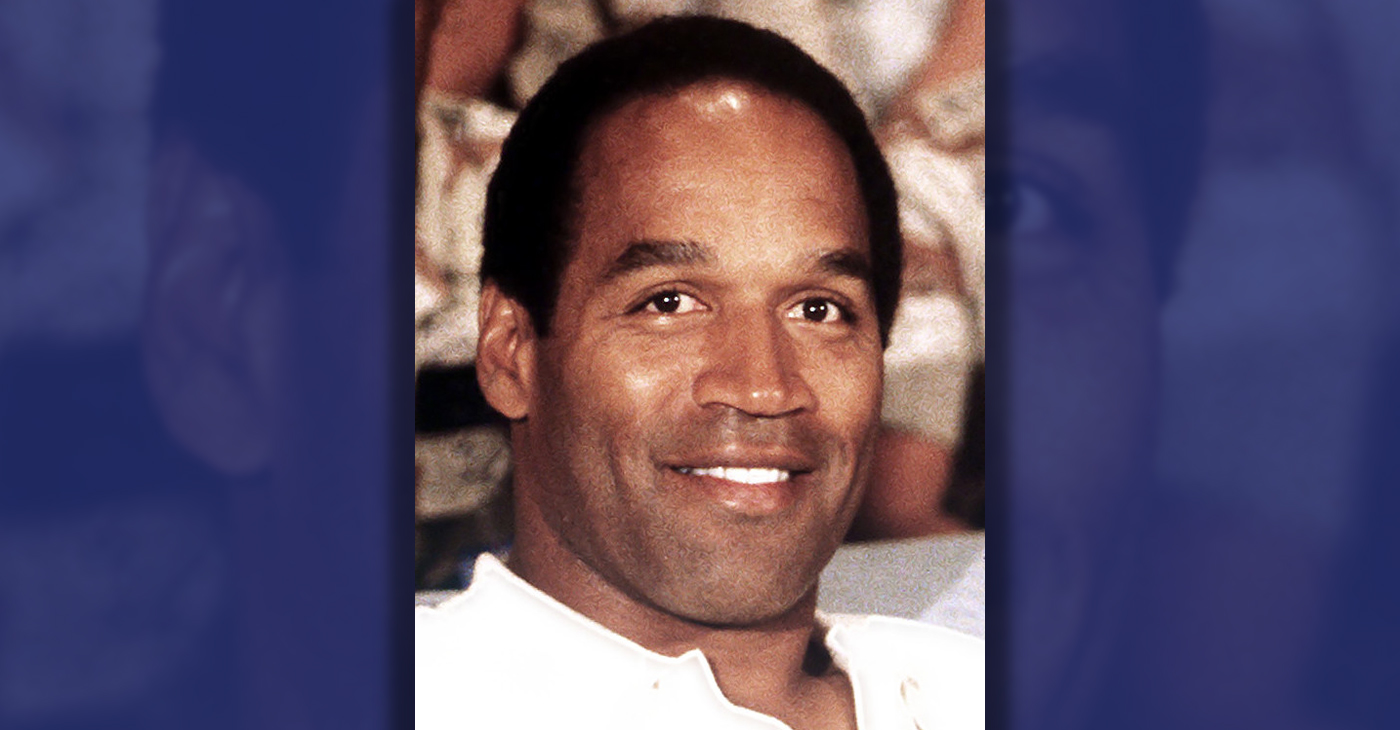
By Post Staff
Orenthal James (O.J.) Simpson, who rose to fame as a college football player who went on to the NFL and parlayed his talents in acting and sportscasting, succumbed to prostate cancer on April 10, his family announced.
Born and raised in San Francisco, the Galileo High School graduate was recruited by the University of Southern California after he was on a winning Junior College All-American team.
At USC, he gained wide acclaim as a running back leading to him becoming the No. 1 pick in the AFL-NFL draft in 1969 and joining the Buffalo Bills, where he had demanded – and received — the largest contract in professional sports history: $650,000 over five years. In 1978, the Bills traded Simpson to his hometown team, the San Francisco 49ers, retiring from the game in 1979.
Simpson’s acting career had begun before his pro football career with small parts in 1960s TV (“Dragnet”) before “Roots” and film (“The Klansman,” “The Towering Inferno,” Capricorn One”).
He was also a commentator for “Monday Night Football,” and “The NFL on NBC,” and in the mid-1970s Simpson’s good looks and amiability made him, according to People magazine, “the first b\Black athlete to become a bona fide lovable media superstar.”
The Hertz rent-a-car commercials raised his recognition factor while raising Hertz’s profit by than 50%, making him critical to the company’s bottom line.
It could be said that even more than his success as a football star, the commercials of his running through airports endeared him to the Black community at a time when it was still unusual for a Black person to represent a national, mainstream company.
He remained on Hertz team into the 1990s while also getting income endorsing Pioneer Chicken, Honey Baked Ham and Calistoga water company products and running O.J. Simpson Enterprises, which owned hotels and restaurants.
He married childhood sweetheart Marguerite Whitley when he was 19 and became the father of three children. Before he divorced in 1979, he met waitress and beauty queen Nicole Brown, who he would marry in 1985. A stormy relationship before, during and after their marriage ended, it would lead to a highway car chase as police sought to arrest Simpson for the murder by stabbing of Brown and her friend Ron Goldman in 1994.
The pursuit, arrest, and trial of Simpson were among the most widely publicized events in American history, Wikipedia reported.
Characterized as the “Trial of the Century,” he was acquitted by a jury in 1995 but found liable in the amount of $33 million in a civil action filed by the victims’ families three years later.
Simpson would be ensnared in the criminal justice system 12 years later when he was arrested after forcing his way into a Las Vegas hotel room to recover sports memorabilia he believed belonged to him.
In 2008, he received a sentence of 33 years and was paroled nine years later in 2017.
When his death was announced, Simpson’s accomplishments and downfalls were acknowledged.
Sports analyst Christine Brennan said: “… Even if you didn’t love football, you knew O.J. because of his ability to transcend sports and of course become the businessman and the pitchman that he was.
“And then the trial, and the civil trial, the civil case he lost, and the fall from grace that was extraordinary and well-deserved, absolutely self-induced, and a man that would never be seen the same again,” she added.
“OJ Simpson played an important role in exposing the racial divisions in America,” attorney Alan Dershowitz, an adviser on Simpson’s legal “dream team” told the Associated Press by telephone. “His trial also exposed police corruption among some officials in the Los Angeles Police Department. He will leave a mixed legacy. Great athlete. Many people think he was guilty. Some think he was innocent.”
“Cookie and I are praying for O.J. Simpson’s children … and his grandchildren following his passing. I know this is a difficult time,” Magic Johnson said on X.
“I feel that the system failed Nicole Brown Simpson and failed battered women everywhere,” attorney Gloria Allred, who once represented Nicole’s family, told ABC News. “I don’t mourn for O.J. Simpson. I do mourn for Nicole Brown Simpson and her family, and they should be remembered.”
Simpson was diagnosed with prostate cancer about a year ago and was undergoing chemotherapy treatment, according to Pro Football Hall of Fame President Jim Porter. He died in his Las Vegas, Nevada, home with his family at his side.
He is survived by four children: Arnelle and Jason from his first marriage and Sydney and Justin from his second marriage. He was predeceased son, Aaren, who drowned in a family swimming pool in 1979.
Sources for this report include Wikipedia, ABC News, Associated Press, and X.
Activism
Oakland Post: Week of April 10 – 16, 2024
The printed Weekly Edition of the Oakland Post: Week of April 10 – 16, 2024

To enlarge your view of this issue, use the slider, magnifying glass icon or full page icon in the lower right corner of the browser window. ![]()
-

 Activism4 weeks ago
Activism4 weeks agoOakland Post: Week of March 27 – April 2, 2024
-

 #NNPA BlackPress4 weeks ago
#NNPA BlackPress4 weeks agoCOMMENTARY: D.C. Crime Bill Fails to Address Root Causes of Violence and Incarceration
-

 #NNPA BlackPress4 weeks ago
#NNPA BlackPress4 weeks agoMayor, City Council President React to May 31 Closing of Birmingham-Southern College
-

 #NNPA BlackPress4 weeks ago
#NNPA BlackPress4 weeks agoBeloved Actor and Activist Louis Cameron Gossett Jr. Dies at 87
-

 Community1 week ago
Community1 week agoFinancial Assistance Bill for Descendants of Enslaved Persons to Help Them Purchase, Own, or Maintain a Home
-

 Activism3 weeks ago
Activism3 weeks agoOakland Post: Week of April 3 – 6, 2024
-

 Business1 week ago
Business1 week agoV.P. Kamala Harris: Americans With Criminal Records Will Soon Be Eligible for SBA Loans
-

 Activism2 weeks ago
Activism2 weeks agoOakland Post: Week of April 10 – 16, 2024




